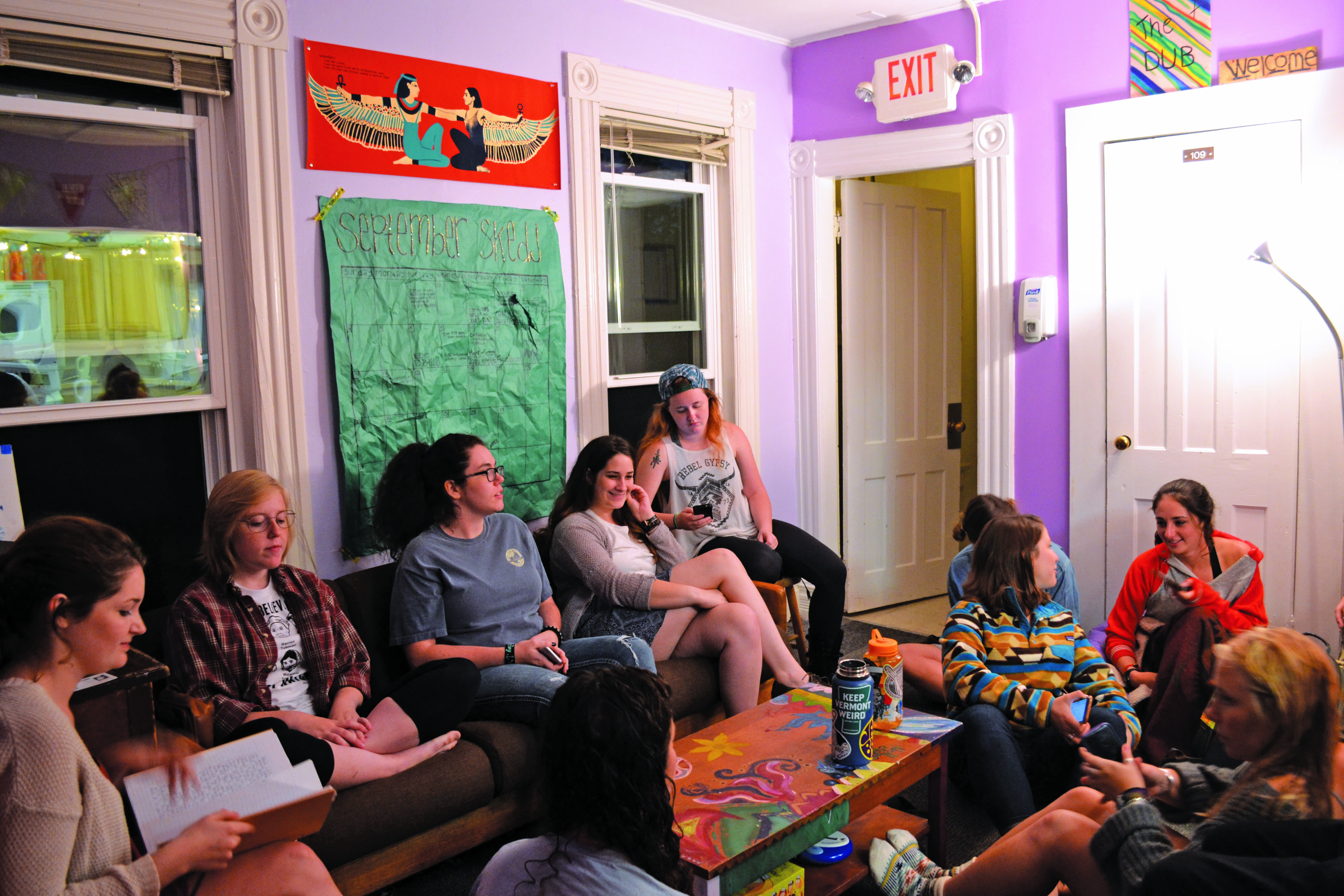On a Tuesday night in the blue house at 3 University, St. Lawrence students are not quietly finishing homework or chatting with friends over pizza from The Pub, as most students do at 8:00 p.m. on a weekday night. Instead, students from all over campus sit in the Dub’s purple living room adorned with Christmas lights, crouched on cushions, chairs the floor, and even squished together on sofas to fit as many people as possible in the small space. The crowded atmosphere does not make the room feel suffocating though. Instead, it only makes the small space feel welcoming, comforting, and full of the energy that can only come from being surrounded by friends.
These students are gathered together for Dub Club, a weekly or biweekly event hosted by the Women’s Resource Center, a.k.a. The Dub. Dub Club is a student initiated communal discussion where students of all genders can come together to openly share ideas, thoughts, and their own experiences, as well as engage in an often cathartic dialogue about gender issues facing campus and the larger community. The Dub Club on September 15th focused specifically on the pressures faced concerning body image. Students gathered together to speak about their own experiences with body image pressures, their thoughts about why these pressures exist, and ideas about how to better face them.
So, what is body image? The majority of students at the discussion agreed that they first became aware of societal pressures concerning how their bodies should look when they entered middle school. Multiple students shared anecdotes about first feeling there was something wrong and undesirable about their bodies when they were at the pool, such as when they noticed their thighs expanding while sitting down or the bulge on their stomach from leaning over. There is something vulnerable about being around others while not wearing a lot of clothes since nudity is so taboo in our country.
“It seems so intertwined with sexuality,” commented one participant at Dub Club, “finally becoming aware that your body can be sexualized.”
Through the discussion, it became evident that there is something universal about the moment of suddenly becoming aware that your body should look a certain way to better fit in as you move from childhood to adolescence. These norms that are circulated throughout the media perpetuate the idea that women should look one way and men should look another; that the genders are distinct, and should remain as polarized as possible. It is often emphasized that any fluidity between what is seen as inherently “feminine” or “masculine” should to be avoided.
For girls, this means removing any body hair that men grow, because as one student noted, “it freaks us out for women to have things on their bodies that men have too.”
For boys, this manifests in our culture through the message that to be masculine, their muscles must be defined, they must be taller than girls they are attracted to, and they must be able to grow facial hair. This is what it means to be a man; you have to be physically more powerful than women. If one’s body does not live up to these often unattainable expectations, somehow this means that they are less of a person. Often times, what others think about our bodies somehow has more power in defining who we are than what we think about ourselves.
“I feel most beautiful after I’ve done a hike or gone for a jog,” said one student, “when my body accomplishes something. It’s the time I feel my body is for me instead of for other people to judge.”
“It gives me control and ownership again of my body,” added another student.
What do St. Lawrence students feel is the best way to free themselves from these damaging societal pressures? At Dub Club, students spoke of how they believe self-acceptance is an ongoing process, and how one should be able use their body for what makes them feel good, while still being cognizant of greater societal pressures and why they exist.
“I really think it all relates back to capitalism. People profit from our self-doubt,” noted one student. In fact, shaving women’s legs was not made popular until WWII when advertisers targeted women to increase the demand for razors while soldiers were away from home, and daily shampooing was only popularized in the mid-twentieth century after the famous Breck ads. If you want to alter your physical appearance, by all means go for it. But also pause to question when you do feel somewhat unsatisfied with your appearance and why you feel that way. Would you feel this way if you were a child still, completely unaware of body image norms? Or are these feelings the result of how society dictates we look? And what is so good about following what people tell us to do anyways? Ultimately our bodies are the only thing in this world which are completely our own, and despite what our culture tells us otherwise, that is something that can never be taken away from us.
Dub Club is held on Tuesdays at 8:00 p.m. at 3 University. To find out about upcoming Dub Club discussion themes and other Dub events, you can like the Women’s Resource page on Facebook or join the Women’s Resource Center group on SLU Wire. New faces are always welcome.



